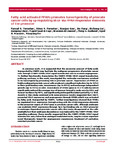Fatty acid activated PPARγ promotes tumorigenicity of prostate cancer cells by up regulating VEGF via PPAR responsive elements of the promoter.
| dc.contributor.author | Forootan, FS | en |
| dc.contributor.author | Forootan, SS | en |
| dc.contributor.author | Gou, X | en |
| dc.contributor.author | Yang, J | en |
| dc.contributor.author | Liu, B | en |
| dc.contributor.author | Chen, D | en |
| dc.contributor.author | Al Fayi, MS | en |
| dc.contributor.author | Al-Jameel, W | en |
| dc.contributor.author | Rudland, PS | en |
| dc.contributor.author | Hussain, SA | en |
| dc.contributor.author | Ke, Y | en |
| dc.date.accessioned | 2018-01-22T11:17:58Z | |
| dc.date.available | 2018-01-22T11:17:58Z | |
| dc.date.issued | 2016-02-23 | en |
| dc.identifier.uri | http://hdl.handle.net/10026.1/10633 | |
| dc.description.abstract |
In previous work, it is suggested that the excessive amount of fatty acids transported by FABP5 may facilitate the malignant progression of prostate cancer cells through a FABP5-PPARγ-VEGF signal transduction axis to increase angiogenesis. To further functionally characterise the FABP5-PPARγ-VEGF signal transduction pathway, we have, in this work, investigated the molecular mechanisms involved in its tumorigenicity promoting role in prostate cancer. Suppression of PPARγ in highly malignant prostate cancer cells produced a significant reduction (up to 53%) in their proliferation rate, invasiveness (up to 89%) and anchorage-independent growth (up to 94%) in vitro. Knockdown of PPARγ gene in PC3-M cells by siRNA significantly reduced the average size of tumours formed in nude mice by 99% and tumour incidence by 90%, and significantly prolonged the latent period by 3.5 fold. Results in this study combined with some previous results suggested that FABP5 promoted VEGF expression and angiogenesis through PPARγ which was activated by fatty acids transported by FABP5. Further investigations showed that PPARγ up-regulated VEGF expression through acting with the PPAR-responsive elements in the promoter region of VEGF gene in prostate cancer cells. Although androgen can modulate VEGF expression through Sp1/Sp3 binding site on VEGF promoter in androgen-dependent prostate cancer cells, this route, disappeared as the cells gradually lost their androgen dependency; was replaced by the FABP5-PPARγ-VEGF signalling pathway. These results suggested that the FABP5-PPARγ-VEGF signal transduction axis, rather than androgen modulated route, may be a more important novel therapeutic target for angiogenesis-suppression treatment of castration resistant prostate cancer. | en |
| dc.format.extent | 9322 - 9339 | en |
| dc.language | eng | en |
| dc.language.iso | eng | en |
| dc.subject | FABP5 | en |
| dc.subject | PPARγ | en |
| dc.subject | PPRE | en |
| dc.subject | VEGF | en |
| dc.subject | prostate cancer | en |
| dc.subject | Animals | en |
| dc.subject | Binding Sites | en |
| dc.subject | Cell Line, Tumor | en |
| dc.subject | Cell Proliferation | en |
| dc.subject | Cell Transformation, Neoplastic | en |
| dc.subject | Fatty Acid-Binding Proteins | en |
| dc.subject | Fatty Acids | en |
| dc.subject | Gene Expression Regulation, Neoplastic | en |
| dc.subject | Human Umbilical Vein Endothelial Cells | en |
| dc.subject | Humans | en |
| dc.subject | Male | en |
| dc.subject | Mice | en |
| dc.subject | Mice, Inbred BALB C | en |
| dc.subject | Mice, Nude | en |
| dc.subject | Neoplasm Invasiveness | en |
| dc.subject | Neovascularization, Pathologic | en |
| dc.subject | PPAR gamma | en |
| dc.subject | Promoter Regions, Genetic | en |
| dc.subject | Prostate | en |
| dc.subject | Prostatic Neoplasms, Castration-Resistant | en |
| dc.subject | RNA Interference | en |
| dc.subject | RNA, Small Interfering | en |
| dc.subject | Signal Transduction | en |
| dc.subject | Vascular Endothelial Growth Factor A | en |
| dc.title | Fatty acid activated PPARγ promotes tumorigenicity of prostate cancer cells by up regulating VEGF via PPAR responsive elements of the promoter. | en |
| dc.type | Journal Article | |
| plymouth.author-url | https://www.ncbi.nlm.nih.gov/pubmed/26814431 | en |
| plymouth.issue | 8 | en |
| plymouth.volume | 7 | en |
| plymouth.publication-status | Published | en |
| plymouth.journal | Oncotarget | en |
| dc.identifier.doi | 10.18632/oncotarget.6975 | en |
| plymouth.organisational-group | /Plymouth | |
| plymouth.organisational-group | /Plymouth/REF 2021 Researchers by UoA | |
| plymouth.organisational-group | /Plymouth/REF 2021 Researchers by UoA/UoA01 Clinical Medicine | |
| plymouth.organisational-group | /Plymouth/REF 2021 Researchers by UoA/UoA01 Clinical Medicine/UoA01 Clinical Medicine | |
| dc.publisher.place | United States | en |
| dcterms.dateAccepted | 2016-01-17 | en |
| dc.identifier.eissn | 1949-2553 | en |
| dc.rights.embargoperiod | Not known | en |
| rioxxterms.versionofrecord | 10.18632/oncotarget.6975 | en |
| rioxxterms.licenseref.uri | http://www.rioxx.net/licenses/all-rights-reserved | en |
| rioxxterms.licenseref.startdate | 2016-02-23 | en |
| rioxxterms.type | Journal Article/Review | en |


